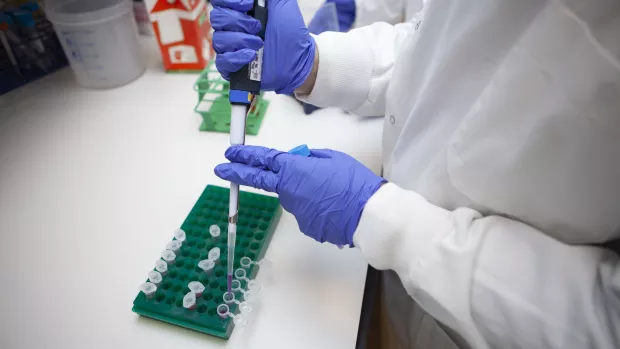
Lipoic acid
Lipoic acid (also known as alpha lipoic acid) is an oral medication. It's now being tested as a treatment for MS, including in one of our clinical trials for primary and secondary progressive MS.
- Current phase of trial:
- Phase 2/3
- Type of MS:
- Relapsing MS, Secondary progressive MS and Primary progressive MS
Find out more about lipoic acid
How does lipoic acid work?
Lipoic acid helps our cells create the energy they need to work properly.
Studies in the lab show it’s able to protect cells from damage as an anti-oxidant. This means it stops too many harmful molecules (oxidants) from attaching to a cell and damaging it. Lipoic acid changes the shape of the point where these harmful molecules attach.
So researchers think as an anti-oxidant it can protect nerve cells in people with MS.
Researchers think lipoic acid also has an effect on the immune system. It seems to dampen down certain signals. In MS, this could reduce the number of immune cells entering the brain and spinal cord. So the cells wouldn't be able to attack and damage myelin.
How is lipoic acid taken?
A tablet taken once a day.
Latest research
Octopus trial
Lipoic acid is one of the drugs in the multi-arm multi-stage clinical trial Octopus. This trial is for people with primary and secondary progressive MS.
In Octopus, several new drugs will be tested at once and compared against a single control group. Instead of just one group taking a new drug, there's multiple groups taking different new drugs. The control group will take a placebo (a dummy drug) as well as continuing existing treatments like siponimod or ocrelizumab if applicable.
Phase 2 trial for progressive MS
A phase 2 clinical trial in the US has recruited 118 people with progressive MS. It aims to assess how well lipoic acid can protect nerves compared to a placebo over two years.
Researchers will be looking at whether treatment changes brain volume when analysed by MRI. They’ll also evaluate changes in mobility using a 25-foot walk test and 20-minute timed walk test. Results are expected in 2024.
Earlier research
Phase 1 trial
A phase 1 clinical trial involving 69 people with relapsing and secondary progressive MS finished in 2016. Researchers wanted to assess the potential benefit of lipoic acid to people with relapsing and secondary progressive MS. Results showed participants had no serious side effects.
Phase 1 trial for optic neuritis
A phase 1 clinical trial involving 31 people with MS who experience optic neuritis finished in 2016. Results of this trial were published in a peer-reviewed journal in May 2019.
The authors found lipoic acid was safe and well tolerated. But there was only a small number of people in the trial. So researchers couldn't say whether lipoic acid treatment could protect nerves from optic neuritis.
Read the full paper from the phase 1 trial for optic neuritis
Phase 2 trial for secondary progressive MS
A phase 2 clinical trial in the US involving 27 people with secondary progressive MS finished in 2016. Researchers wanted to find out whether lipoic acid can protect the brain and slow disability progression.
After 2 years, people had less brain atrophy (loss of volume). This suggested it could protect the nerves of people with secondary progressive MS.
Phase 2 trial
A phase 2 clinical trial involving 54 people with relapsing and secondary progressive MS finished in 2017. Researchers wanted to find out whether lipoic acid could improve cognitive function for people with MS.
After 12 weeks of taking lipoic acid, there was no improvement to cognition for people in the study.
What are the side effects of lipoic acid?
We're not yet sure what the side effects of lipoic acid for people with MS might be.
Side effects reported in other conditions include headache, pins and needles, skin rash and muscle cramps.
Previous phase 1 and 2 clinical trials involving people with relapsing and secondary progressive MS showed there were some side effects. These were often related to the digestive system. But these were small trials. Larger trials will help us find out if lipoic acid can have side effects for people with MS.
How does lipoic acid compare with current therapies?
Lipoic acid has not yet been compared with other MS treatments.
When is lipoic acid likely to become available?
Some versions of lipoic acid are available as dietary supplements. But we don't know if they are safe and effective for people with MS. These aren't the same as the version used in research. And it’s not always clear how they’re made or what they contain.
We need our clinical trial Octopus to tell us whether they’re effective at slowing disability progression. And if they have side effects. As recruitment starts at the beginning of 2023, we’d hope to have the results in 2028 or 2029.
A carefully controlled clinical trial is the safest way for people to take new drugs. The drugs themselves are designed to be exactly the right formula and dose. And your health is closely monitored by a team of neurologists and MS nurses.
Without large clinical trials showing a drug is safe and effective, new treatments can’t be licensed and made available on the NHS.
Other countries
Lipoic acid is approved in Germany to treat neuropathy, but not MS. In neuropathy, nerve cells stop working in the extremities of the body. Often this is a result of diabetes.



